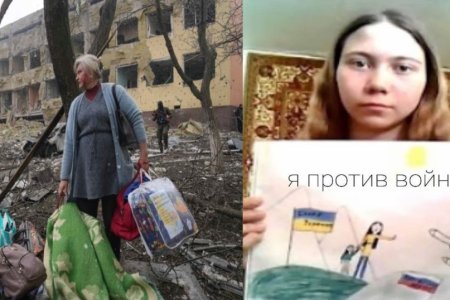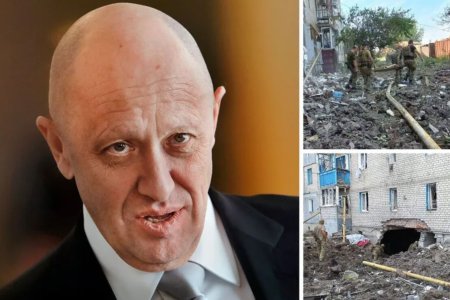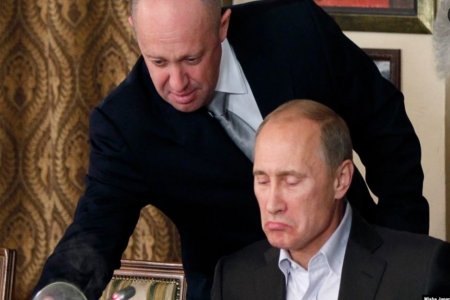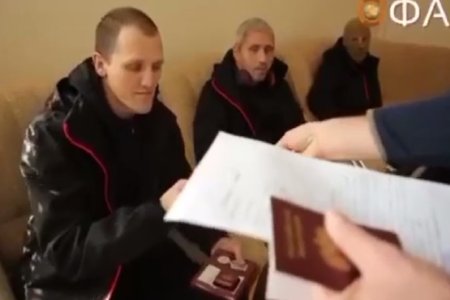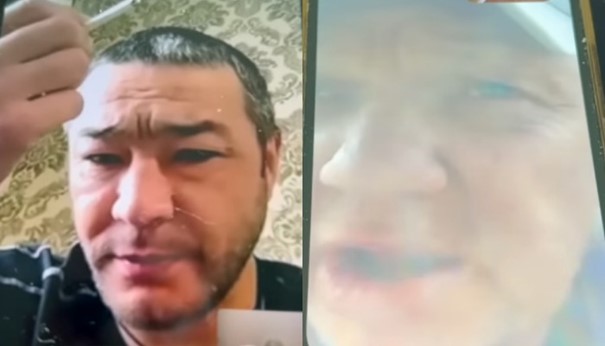
Two former Russian convicted prisoners sent to fight and kill in Ukraine as Wagner Unit mercenaries have said that they committed war crimes, including the killing in cold blood of Ukrainian children and teenagers, as well as prisoners of war. Ukraine’s Prosecutor General’s Office has announced that it is checking the statements, although it is likely to be difficult to fully confirm or refute the information until the Russians are driven out of Bakhmut and Soledar where the men were deployed.
The human rights group Gulagu.net published two interviews on 17 April, taped over the course of a week by the head of Gulagu.net Vladimir Osechkin. Both mercenaries were recruited while serving long sentences and then pardoned through decrees issued by Russian President Vladimir Putin and both were ex-commanders of Wagner unit divisions. Azamat Uldarov is a former prisoner from Prison Colony No. 13 in Saratov oblast, who was pardoned by presidential decree on 23.08.2022. 49-year-old Alexei Savichev was imprisoned in Prison Colony No. 1 in the Voronezh oblast before being recruited to kill Ukrainians. He was pardoned by Putin on 02.09.2022. He had served 30 years, at least part of which was for murder and had only months to serve. Asked why, if he had so little time left of his sentence, he had decided to go to Ukraine, he explained that he wanted “to change the picture”. “And they were taking people, anyone who could kill. I can kill, that’s all.” Part of ‘the picture’ did, indeed, change since, after 30 years a prisoner, he became the ‘commander’ of a Wagner unit. This was because they were all prisoners, he says, and he was the most senior and others did what he said.
It remains unclear why the men, both of whom are still in Russia, are so open about their crimes and the role played by Yevgeny Prigozhin, the founder and financer of the so-called Wagner private military company (and himself a former convicted criminal who gained his millions through Putin’s patronage). It is possible that the revelations are part of the ongoing fight for power between Prigozhin and Russia’s defence ministry. This does not, however, make them untrue, and Gulagu-net has confirmed the men’s recruitment and the presidential pardons.
Uldarov, who appears drunk most of the time, gets tearful talking about killing children, but is willing to return, while Savichev expresses absolutely no remorse, and keeps repeating, over and over again, that he was given orders and carried them out. He does, however, say that they were threatened with ‘elimination’ if they spoke with journalists. Prigozhin himself has claimed that the information is false, however the interviews come after several videos were made public in which Wagner mercenaries executed Ukrainian prisoners of war and there have been plenty of other accounts, including from Andrei Medvedev, a Wagner unit mercenary who fled abroad. There has, in fact, been a steady stream of admissions to war crimes from Russian fighters (Igor Girkin; Aleksandr Borodai; Alexei Milchakov and others) since 2014, with these by no means from men who regret their actions, rather the contrary.
Alexei Savichev is equally unencumbered by feelings of guilt or responsibility, although he does demur over the use of certain words in a way that would be comical were the crimes he is admitting to not so horrific. He describes obeying the order to kill all civilians, aged 15 and over, yet objects to the word ‘civilian’ [in Russian ‘peaceful citizen’] and says he wouldn’t call 15-year-olds civilians. When Osechkin changes the word, and asks about “Ukrainians”, Savichev suggests that as many as 20 teenagers were killed. He is also adamant that the Wagner unit does not take prisoners of war. When asked how, in that case, there was an exchange of prisoners, he says that these were Ukrainians captured by units under the Russian defence ministry, not Wagner.
He doesn’t like talking about ‘Russians’ being killed either, and calls them ‘K-men’ from Prigozhin’s ‘K project’ (the expansion of the Wagner unit’s already considerable role through the recruitment throughout Russia of thousands of criminals serving sentences, many for multiple murders or other violent crimes). 70 such Russians were shot in his presence for refusing to fight, not obeying orders, etc.
On 19 or 20 January 2023, he also hurled around 30 grenades into a pit containing more than 50 Ukrainians and Russians. He doesn’t know how many were Russian, how many Ukrainian, but says that he did see that there were “our lot” in there, and informed his commander who said that “they’re no longer ours” and told him to get rid of them all. There were no cries for help from the pit, but he was clear that there were people who were alive (“were breathing”) when he threw grenades in, one at a time. In response to Osechkin’s question as to whether all had then been killed, he says he didn’t give a toss, his task was to obey the order (his constant refrain). Afterwards, he used petrol to burn the bodies.
The Guardian has since spoken with Savichev by telephone and were told that “he participated in summary executions of Ukrainian prisoners of war during his six months of fighting in eastern Ukraine. We were told not to take any prisoners, and just shoot them on the spot,” he said. He also showed the Guardian photos of two medals that he said he received for his part in the battle for Soledar. He further admitted to the killing of 20 Ukrainian soldiers who were surrounded. “It is war and I do not regret a single thing I did there. If I could, I would go back.” One telling difference in his admissions to the Guardian was that he spoke only of Ukrainian POWs in the pit that they threw grenades at and then burned, whereas he told Osechkin that there were Russians there also. He saw no reason to conceal torture either, an unequivocal war crime. “We would torture soldiers too, there weren’t any rules.”
Both Savichev and Uldarov speak of being ordered to “clean up”, with this essentially meaning to kill any survivors, regardless of their age. Uldarov says that he took part in killing people sheltering in the basement of an apartment block in Bakhmut and that he had shot and killed a small child, who was just five or six.
Savichev told the Guardian that he is now on the run and fears that the Wagner unit will execute him, as they did Yevgeny Nuzhin. The latter was also a Wagner mercenary who had surrendered to the Ukrainian Armed Forces, but then, in circumstances that remain unclear, ended up back in the clutches of the Wagner unit, and executed on video.
Savichev rubbishes the idea that there could be an investigation of the killing of Russians by Russians because of Prigozhin’s relations with Putin. There have been no attempts over the past 9 years to get those who publicly admit to war crimes in Ukraine punished, and the only convictions in Russia have been of those accused of wanting to take part in the fighting on Ukraine’s side, or, since the full-scale invasion, of those who condemn Russian aggression and atrocities. Although there have recently been reports that two of the men who tortured and murdered 16-year-old Ukrainian schoolboy Stepan Chubenko in July 2014 have been detained, it remains to be seen whether they remain in custody. Up till now, Russia was more than happy to protect such individuals, and even provided Vadim Pogodin with lucrative state contracts in occupied Crimea.
